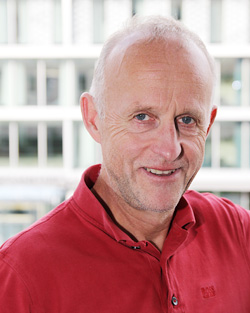
- Date of birth: 070853
- Present position: Professor of Palliative Medicine, Faculty of Medicine, NTNU.
- Vice managing director, St. Olavs Hospital, Trondheim University Hospital.
- Director of the European Palliative Care Research Centre, Faculty of Medicine, NTNU.
| Education: | |
|---|---|
| 1980 | Medical doctor, University of Oslo |
| 1989 | Certified specialist in Oncology |
| 1989 | PhD (dr.med.), University of Oslo |
| Work experience: | |
| 1980-81 | Internship in surgery and internal medicine, Notodden Hospital, Norway, |
| 1981 | Internship community practice, Fjaler, Norway |
| 1981-82 | Family Medicine in private practice Bærum, Norway |
| 1983-86 | Junior doctor in medical oncology and radiotherapy, The Norwegian Radium Hospital, Oslo |
| 1986-87 | Research fellow/PhD-student, The Norwegian Cancer Society, Oslo, Norway |
| 1988-89 | Junior doctor internal medicine, Diakonhjemmets Hospital/Lovisenberg Hospital, Oslo, Norway |
| 1990-93 | Consultant medical oncology and radiotherapy, The Norwegian Radium Hospital, Oslo, Norway |
| 1990-94 | Chair of the Board, Institute for Environmental Medicine, Faculty of Medicine, NTNU, Trondheim, Norway |
| 2002-06 | Chair of the Board, Institute for Cancer Research and Molecular Medicine, Faculty of Medicine, NTNU, Trondheim, Norway |
| 1993-10 | Director of Palliative Medicine Unit, Trondheim University Hospital, Norway |
| 1993- | Professor of Palliative medicine, Faculty of medicine, NTNU, Norway |
| 2006- 2013 | National Cancer Director, Norwegian Directorate of Health, Oslo, Norway |
| 2009- | Director, European Palliative Care Research Centre, NTNU, Norway |
| 2010- 2013 | Head of the Cancer Clinic, St. Olavs Hospital HF, Trondheim, Norway |
| 2013- | Deputy managing director, St. Olavs Hospital HF, Trondheim, Norway |
| Selected merits/assignments: | |
| 1998-01 | Chair of the Program for Research on Alternative Medicine, The Norwegian Research Council |
| 1999-05 | Member of the Board, Norwegian Association for Palliative Medicine |
| 1999-05 | President of the European Association for Palliative Care, EAPC |
| 2000-05 | Member of the Program Committee for Applied Clinical Research and Alternative Medicine, Norwegian Research Council |
| 1993-07 | Member of the Evaluation Committee for Clinical and Epidemiological Research, The Norwegian Cancer Society |
| 2007-08 | Member of the Program Committee, Patient and Survivor Care, ASCO |
| 2007-08 | Committee Member, Canadian Institutes of Health Research (CIHR) |
| 2007-08 | Reviewer for the “Palliative & End of Life Care” peer review committee, CIHR IRSC, Canada |
| 2007-08 | Section Editor, The Oncologist |
| 2007-09 | Member of the IAEA Group for Palliative Radiotherapy |
| 2007-10 | Chairman, Møbius Research Award, The Norwegian Research Council |
| 2008-09 | Member of the Expert group for the Minister of Health |
| 1993-this date | Professor of Palliative Medicine, Faculty of Medicine, NTNU |
| 1993-this date | Member, European Association for Palliative Care Research Network (EAPC RN) |
| 2005-this date | Editorial board, European Journal of Palliative Care |
| 2006-this date | Co-editor, Palliative Medicine |
| 2007-this date | Co-editor, Oxford Textbook of Palliative Care |
| 2007-this date | Chair, EAPC RN |
| 2007-this date | Member of the Editorial Board of Archives of Medical Science |
| 2007-this date | Member of the Assessment panel for the Australian Government Cancer Clinical Trials. |
| 2008-this date | Reviewer, Wolters Kluwer Health |
| 2008-this date | Board member of International Association of Hospice and Palliative Care, IAHPC |
| 2008-this date | Member, DKNVS Academy (The Royal Norwegian Society of Sciences and Letters) |
| 2009-this date | Chair for European Palliative Care Research Centre (PRC) |
| 2009-this date | Evaluator of proposals for the EU Framework 7 HEALTH-2010 single stage cancer call |
| 2009-this date | Member of the International Advisory Board, Lancet Oncology |
| 2011-this date | Member of the Editorial Board, BMJ Supportive & Palliative Care Journal (SP Care) |
| 2012-this date | Member of the Editorial Board, "The Open Access Journal of Science and Technology" |
| 2012-this date | Editorial Board of Annals of Palliative Medicine (APM |
臨床腫瘍学における緩和ケアの確立と統合
要約
がんの発生率や有病率は増加してきている。診断学における新しい進歩と治療を統合させることは、がんに罹患した人々の予後延長に寄与することであろう。診断学や治療の進歩によりWHOは緩和ケアの定義を見直し、現在は疾患の経過で化学療法や放射線治療のような主流的ながん治療と並行して早期から適用される必要性を強調している(1)。このような経緯で患者の症状の負担は早期から軽減されることが可能になり、病気の治療期においても可能となっている。
緩和ケアを背景として患者のQOLに着目すると、在宅療養の期間が重要な因子となる。ノルウエーでは、ほとんどの人が在宅療養を希望しているのにもかかわらず、在宅死は13%に過ぎない(2)。早期からの緩和ケアの介入が、在宅療養に影響するかもしれないし、同様に症状コントロールや全体のQOLも改善するかもしれない(3)。
緩和ケアのアプローチは、医師や看護士に加え理学療法士、栄養士、聖職者、ソーシャルワーカーなどの多職種チームによる取組みを包括している。これによって患者が疾患に対処するための様々なツールを広く利用することができる。
在宅期間をもっと長くするためには、医療システムの全てのレベルで十分な対応力を備えていることが前提となり、加えてプライマリケアと専門領域医療システム間のシームレスなコミュニケーションや協同、そしてオンコロジストと緩和ケア専門医との間も同様であろう。最低限の有効なレベルで患者の治療やフォローアップを可能とするようなモデル作りを促進させるためには、標準化したケアのパスがとても重要になる。クリティカルパスのようなものは患者の病の軌跡全体を通して課題や責任を明らかにし(4)、そして実施すべき早期からの緩和ケアと腫瘍学の間の統合したアプローチを行うシステムを明確にする。その結果として、早期から末期まで全ての病期の患者に提供されるケアの質を改善することになるであろう。
Reference
- 1. World Health Organisation (WHO): Palliative Care Definition [cited 2014 13.02.].
Available from: http://www.who.int/cancer/palliative/definition/en/. - 2. Cohen J, Houttekier D, Onwuteaka-Philipsen B, Miccinesi G, Addington-Hall J, Kaasa S, et al. Which Patients With
Cancer Die at Home? A Study of Six European Countries Using Death Certificate Data. Journal of Clinical Oncology. 2010;28(13):2267-73. - 3. Temel JS, Greer JA, Muzikansky A, Gallagher ER, Admane S, Jackson VA, et al. Early palliative care for patients with metastatic non-small-cell lung cancer. N Engl J Med. 2010;363(8):733-42.
- 4. Rotter T, Kinsman L, James E, Machotta A, Gothe H, Willis J, et al. Clinical pathways: effects on professional practice, patient outcomes, length of stay and hospital costs. Cochrane database of systematic reviews (Online).
2010(3):Cd006632.
(邦訳:小池和彦)










